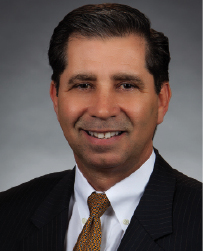 How does Bobby Crifasi manage New Orleans CC so well? Let us count, and spell, the ways.
How does Bobby Crifasi manage New Orleans CC so well? Let us count, and spell, the ways.
The numbers came first, when Bobby Crifasi decided he was going to study them at Louisiana State University. That led to the first set of letters—a B.S. in Accounting, followed by his earning a Certified Public Accountant designation.
AchievementsAT NEW ORLEANS COUNTRY CLUB
|
After becoming a CPA, Crifasi dove back into numbers, going to work for a public accounting firm. One of the clients he was assigned to audit was New Orleans Country Club (NOCC), and he continued to conduct the club’s audit for several years, over which time he became friendly with NOCC’s long-time Controller.
One year, the controller told Crifasi he was getting ready to retire—and suggested that Crifasi apply for the job. He did, and was hired for it in 1988. After three years in that position, he was promoted to Clubhouse Manager—and a year after that, as NOCC’s new General Manager.
That’s when some more letters really started to pile up. To learn more about his new role, Crifasi earned Certified Club Manager and Certified Chief Executive designations through the Club Managers Association of America (he also got another degree, a minor in hotel, restaurant and tourism management, from the University of New Orleans).
Over the next 18 years, Crifasi went on to manage the numbers and operations of New Orleans Country Club so well—including after the devastation in 2005 from Hurrican Katrina, which depressed the club’s revenues for three years and required $5 million in unplanned renovations—that one of the club Presidents he served, R. Parke Ellis, used a host of new letters to describe how much Crifasi has meant to the continued success of NOCC, which will celebrate its 100th anniversary in 2014.

New Orleans CC is planning a new round of capital improvements in 2012, to be completed in time for its 100th anniversary celebration in 2014.
“From a governance standpoint, Bobby truly fills the role of the club’s CEO, CFO, and COO,” Ellis said. “That is a lot of hats, all of which he wears with the highest capability.”
Ellis said this when nominating Crifasi for an Excellence in Club Management Award, through the recognition program co-sponsored by the McMahon Group and Club & Resort Business. That led to still more letters: ECM, to recognize Crifasi as the 2010 winner in the 600 or More Full-Privileged Members category.
Just Plain Bobby
Bobby Crifasi is actually the last person who would ever think of waving any credentials around to flaunt his expertise or achievements. His affable and unpretentious nature, genuine humility, and desire to always shift the focus and attention away from himself and towards members, guests and staff, are in fact big reasons why his shift from accounting to hospitality went so smoothly.
But another key to his success in club management comes from his original training and how it helped him develop the ability to analyze situations in reasoned, objective fashion.
This obviously served Crifasi, and NOCC, well in setting the course for recovery from the Katrina catastrophe. It also came into play again last year, after the latest challenge to the Gulf region from the BP oil spill.
“Our Executive Chef, Chris Tefarikis, did an absolutely wonderful job of searching for alternative seafood items whenever we weren’t able to get all that we wanted, or prices got too high,” says Crifasi, redirecting the credit in typical fashion.
“Where we did run into issues, such as when oysters got very tough to get, we just made adjustments on the [flexible] side of our menu, where we change things regularly based on freshness and availability,” he adds. “But because Chris had such great relations with local vendors, for the most part we really didn’t miss a beat.”
Does Crifasi prefer that those he works with have a similar grounding in accounting-style analysis, and a flair for number-crunching?
“If that’s not their strong suit, that’s OK,” he says. “I actually like it when they’re stronger in other areas than I am, and between the two of us we can complement each other.”
But over the years, Crifasi adds, he has been able to help his department heads see that if you stare long enough at the numbers, something else that can be done to help keep costs under control is bound to be seen.
“The number-one cost item is labor,” he says. “You don’t ever want to be in a position where you don’t have enough people to provide good service. But if you really study how you’re set up—both in terms of how many people you have working, and what the business levels are during those periods—the chances are pretty good you’ll still be able to find some overlap that can be addressed.”









Tell Us What You Think!
You must be logged in to post a comment.